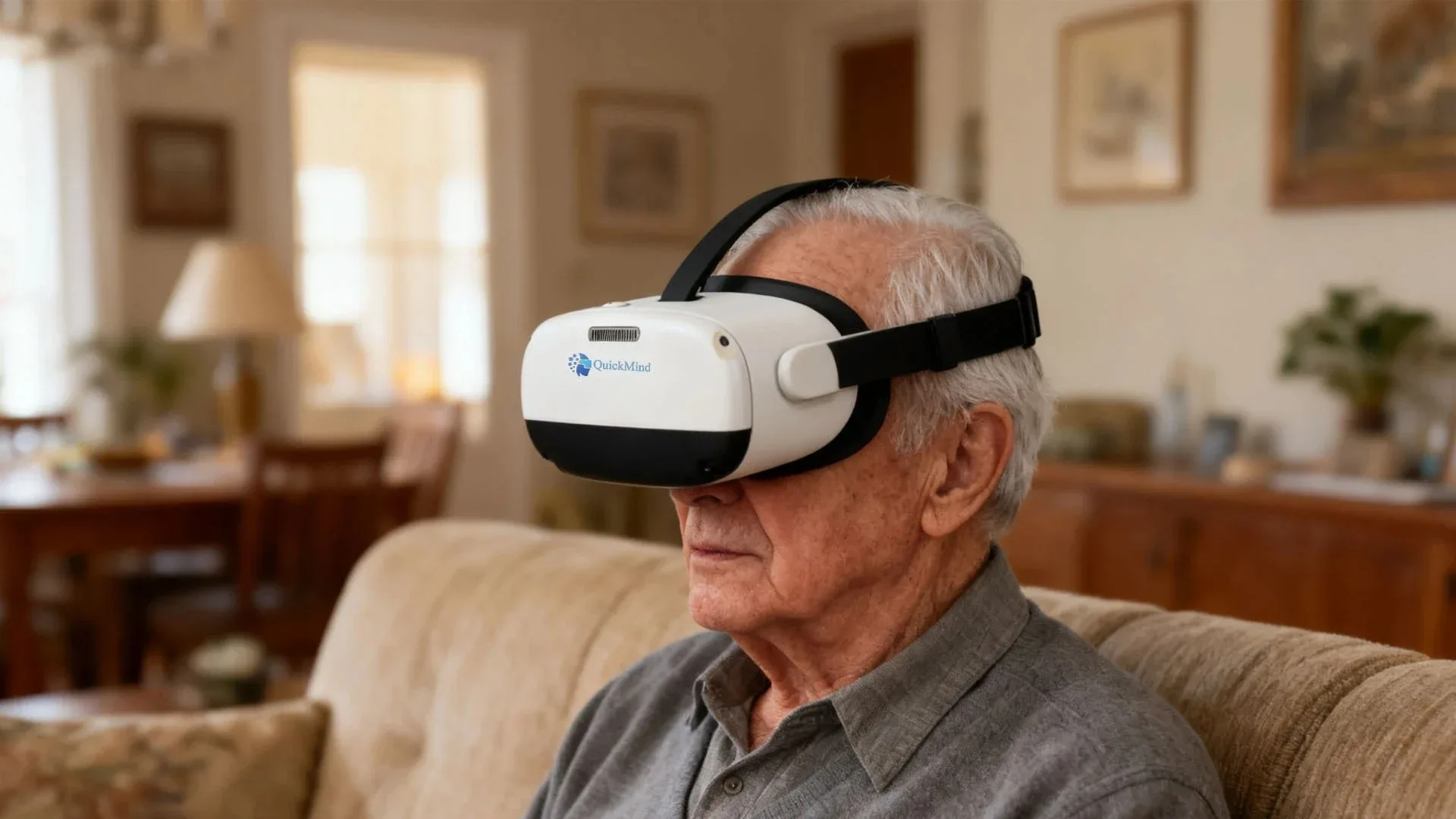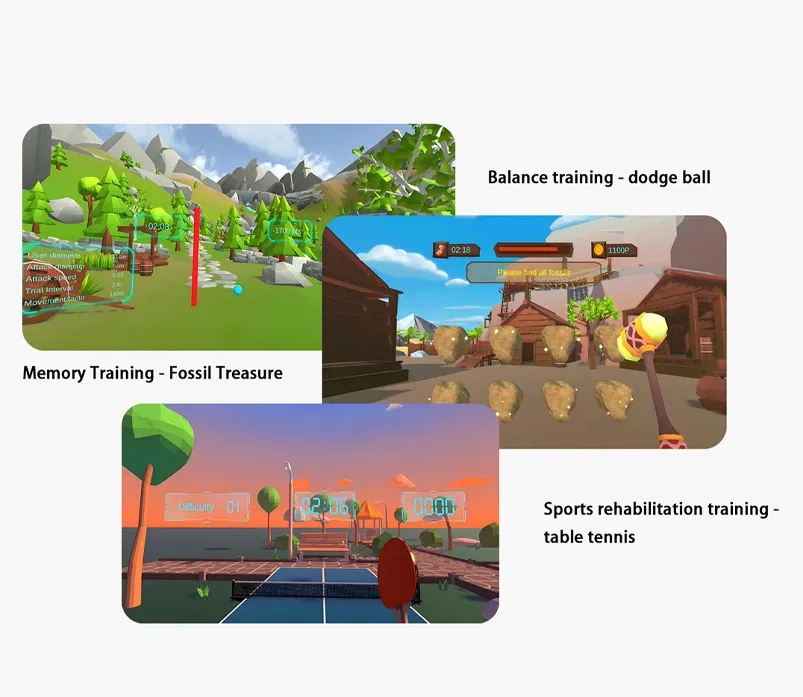
Expanding assessments demonstrates that virtual simulation strategy can greatly upgrade the conditions of subjects dealing with brain function deterioration. By shifting them to calming places, VR grants a unique means for thought encouragement, emotional stabilization, and personal connection. Multiple tests have demonstrated that VR therapy can lower turmoil, stress, and melancholy in dementia subjects while also strengthening their recollection, concentration, and verbal abilities.
- VR enables subjects with dementia to relive beloved recollections through collaborative simulations.
- In addition, it can allocate a risk-free and encouraging space for social contact, encouraging a sense of bond and fitting in.
- Specialists assert that VR therapy has the potential to transform dementia assistance by contributing new and state-of-the-art ways to tackle the complex obstacles faced by people struggling against this state.
Computerized Brain Enhancement Methods for Alzheimer's
Progressive online strategies are showing promise in the area of mental capacity building for individuals dealing with Alzheimer's dementia. These programs exploit digital innovation to boost brain performance and possibly curtail the spread of the syndrome. Interactive regimens, personalized recommendations, and mental training are some models of procedures being analyzed in this dynamic branch. While examinations are underway, digital therapeutics afford a supplementary means for bettering the health of those affected by Alzheimer's dementia.Addressing Alzheimer's with Virtual Territory Journeys
Regarding individuals managing Alzheimer's dementia, the persistent waning of brain power and intellectual capacities can substantially influence their capability to engage with the world around them. This devastating disorder often brings about in loneliness, agitation, and a lessened self-recognition. Modern developments in virtual reality technology offer a trailblazing possibility to handle these complications by producing immersive realities that can enhance the brain and restore cognitive function.
Digital reality environments tailored specifically for Alzheimer's clients can engulf them in known venues, such as their first house or a preferred green space, evoking positive memories and easing anxiety. Through interactive activities, these virtual worlds can also develop cognitive abilities like mind retention, vigilance, and decision-making.
The prospects of virtual reality in Alzheimer's intervention are great. Early investigations have demonstrated favorable results, with cases showing improvements in cognitive capacity, mood, and overall quality of life. As this technology proceeds, it holds the key to changing the way we approach Alzheimer's disease, due a new pathway for assistance and strengthening.
Virtual Reality Reminiscence for Alzheimer's
Reminiscence therapy is an established technique used to advance cognitive function and emotional well-being in individuals with Alzheimer's disease. This long-standing form of therapy involves inducing patients to express past experiences, often through talks. However, a advanced approach is emerging: VR-mediated reminiscence therapy.
This immersive technology utilizes virtual reality headsets to relocate patients in authentic environments that arouse memories from their past. By going through these constructed realities, individuals with Alzheimer's can connect with their past in a meaningful way.
The Role of VR in Enhancing Dementia Patient Recall and Cognition
Virtual reality (VR) is emerging as a novel method in the fight against dementia, granting modern ways to invigorate memory and cognition. By designing immersive experiences, VR can enable individuals with dementia recall memories, associate in meaningful activities, and improve cognitive competencies. Studies have proved that VR interventions can effect significant improvements in memory recall, attention, and cognitive awareness. Moreover, VR provides a comfortable and inviting space for individuals with dementia to interact, reducing feelings of isolation and worry.
- Furthermore, VR can be adjusted to individual needs and preferences, allowing heightened levels of connection.
- Despite the potentials of VR, extended research is needed to fully understand its long-term effectiveness in dementia care.
Renewing Memories, Enhancing Relationships: VR for Alzheimer's Social Health
Artificial digital experiences is emerging as a state-of-the-art mechanism in the domain of Alzheimer's disease. By crafting engaging and interactive spaces, VR has the potential to rekindle memories, encourage social interaction, and advance the overall quality of life for users struggling with Alzheimer's. Especially an important promising aspects of VR VR is its ability to carry users to classic spots and events from their past. Whether it's a visit to a childhood home or a reenactment of a beloved holiday, these virtual travels can stimulate happy memories and bolster cognitive power. Furthermore, VR can aid social interaction by joining individuals with others who share similar experiences. This can be particularly profitable for people with Alzheimer's who may grapple with traditional social communication. By establishing a safe and interesting virtual space, VR can soothe feelings of isolation and loneliness, which are common among patients coping with Alzheimer's. Overall, VR holds immense promise for remodeling the lives of patients with Alzheimer's by reviving memories, rebuilding connections, and enhancing their quality of life. As technology goes on advance, we can expect even more advanced applications of VR in the field of dementia care.Leveraging Cognitive Training: Utilizing VR for Alzheimer's Symptom Management
Artificial reality platforms is rapidly emerging as a cutting-edge tool in the realm of cognitive training, particularly for individuals struggling with Alzheimer's disease. By immersing patients in interactive and engaging virtual environments, VR-based interventions can boost cognitive functions such as memory, attention, and problem-solving. These games frequently incorporate elements of storytelling, exploration, and social interaction, making the training process more enjoyable. Studies have shown that VR-based cognitive training can lead to considerable improvements in cognitive performance, conceivably delaying the progression of Alzheimer's symptoms. Moreover, VR provides a safe and controlled environment for patients to practice new skills and improve their confidence.
- Game-style methods in VR training can make it significantly captivating and exciting for users with cognitive difficulties.
- VR simulations can offer lifelike scenarios that encourage and raise cognitive functions.
- Personalized VR experiences can cater to individualized wishes and procedures.
Virtual Reality: New Horizons in Dementia Assistance
Engaging simulated worlds offer a breakthrough and hopeful avenue for participants with mental deterioration. These methodologies can construct familiar environments, allowing those affected by cognitive decline to engage with cherished memories and encourage a sense of security. By addressing the effects of dementia, VR environments have the ability to boost quality of life for both patients and their families.
- Investigations indicate that VR applications can noticeably impact cognitive function, mental well-being, and even locomotor abilities in individuals with dementia.
- Moreover, VR delivers a safe and supervised environment for examination, reducing the risk of damage.
- Likewise, VR can enhance social associations by allowing individuals with dementia to bond in online activities with others.
VR: A Promising Approach to Alzheimer's Diagnosis and Treatment
neurodegenerative Alzheimer's type presents a intricate obstacle, often being latent in its early stages. However, virtual reality (VR) is emerging as a groundbreaking tool for early detection. Through immersive simulations, VR can monitor cognitive abilities in ways that traditional methods fail to. This prospect allows for rapid assistance strategies, potentially reducing disease progression and boosting the quality of life for individuals with Alzheimer's.
- Virtual reality evaluations provide cognition, focus, and orientation testing within secure and managed environments.
- Adaptive virtual reality tools motivate subjects to engage in neural stimulation efforts.
- Interactive virtual contexts enable socialization and interaction for Alzheimer's patients.
Bridging the Gap: Virtual Reality for Engagement and Participation in Dementia Care
{In the realm of dementia care, innovative technologies are emerging to supplement the lives of participants managing dementia. Virtual reality (VR) is one such resource that holds immense power for enhancing social engagement and communication in dementia care. By constructing engaging artificial realities, VR can stimulate cognitive function, reduce behavioral issues, and ultimately improve the overall well-being of clients affected by dementia.
VR experiences tailored to dementia care can range from remembering therapy sessions that bring individuals into past familiar contexts, to interactive games that promote social interaction and cognitive exercise. Furthermore, VR has the power to connect persons managing dementia with social groups, regardless of physical remoteness, fostering a sense of acceptance.
- VR can facilitate in reducing agitation and anxiety by providing a calming and engrossing environment.
- Research have shown that VR interventions can lead to improvements in cognitive function, mood, and social interaction in dementia patients.
- As technology progresses to evolve, we can expect even more innovative and efficient
